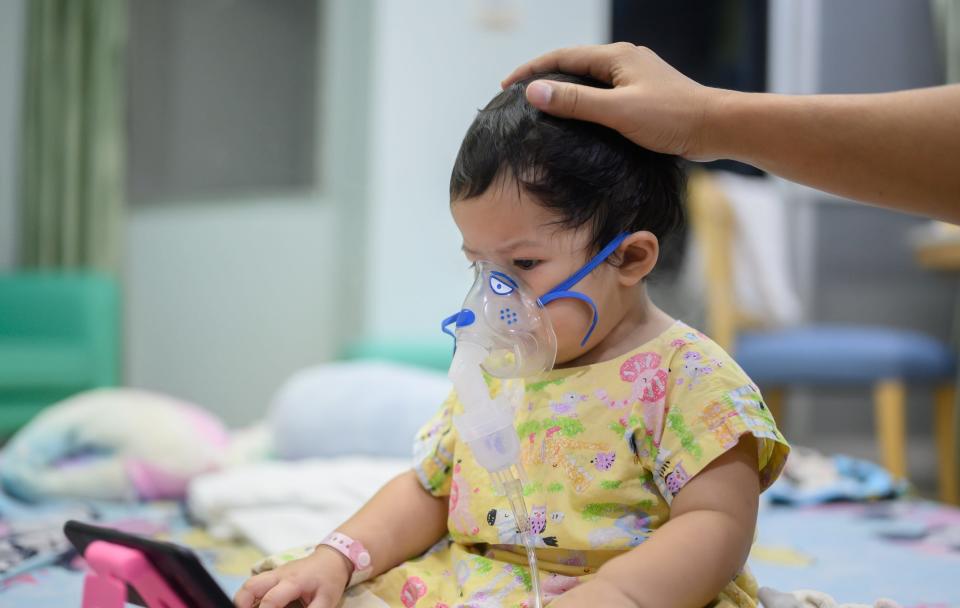As school begins in NJ, here's how to prepare your kids for flu, RSV and COVID
- Oops!Something went wrong.Please try again later.
Packed pediatricians' offices. Late-night visits to the emergency room. Bare pharmacy shelves.
Those were some of the scenes that played out in New Jersey last fall when the flu, RSV and to a lesser extent COVID developed into a "tripledemic" that created a wave of sick children and a shortage of basic medication.
With parents beginning to prepare for the start of the new school year in two weeks, doctors and public health officials say the region could again have a rough cold and flu season.
"We anticipate as high a volume as last year," said Dr. Katharine Clouser, a pediatrician and vice chair of clinical affairs for Hackensack Meridian Health. "We often look to the Southern Hemisphere and especially Australia to see how they've handled respiratory illness during their winter, and they've had a tough RSV and flu season."
There are more options for parents this year, with new medication and vaccines that could help prevent the worst symptoms from emerging. But the process may require as many as three injections for the youngest children.
New shot for RSV

Of all the respiratory diseases that affect young children, none is more prevalent than RSV — respiratory syncytial virus. Its impact can range from minor cold-like symptoms to serious lung ailments such as bronchiolitis or pneumonia.
Regulators recently approved a new drug to fight RSV in children up to age 2 in hopes of avoiding the surge seen last year.
The new monoclonal antibody called Beyfortus acts like a vaccine and was shown to prevent lower respiratory tract disease in infants and children entering or during their first RSV season in clinical trials. Children up to age 2 who are at increased risk of severe disease can be given the drug if they're entering their second season of RSV.
Clouser said her network's pediatricians are recommending it to parents and are awaiting shipments.
"It doesn't prevent it, but gives your baby a head start in fighting against RSV," she said. "It makes it less severe. They might have a cold or be coughing, but they're not so sick that they need to go to a hospital."
Repeat flu season?
Last year's flu season was one of the worst in recent years.
After two years of mask-wearing and social isolation due to the COVID pandemic, influenza spread much faster and earlier as COVID-related mandates ended and the state's "return to normalcy" campaign faced its first regular school year. Four children died from the flu last season in New Jersey after no deaths the prior two seasons.
Children began contracting the flu in late August, usually unheard of in New Jersey. The spread peaked from November through December instead of the usual peak period of January through early March.
The early onset caused major disruptions to supplies of children's medicines and pain relievers, as parents began buying them in early fall.
By November and December, many pharmacies were without such basics as acetaminophen, ibuprofen and some antibiotics. Some parents ended up using expired medication or even rationed pills by breaking them in half — two practices that doctors discourage.
Courtney Coelho, a CVS spokeswoman, said the company's pharmacies are "well positioned to meet the demand for over-the-counter cough, cold and flu medication" for the coming season but didn't provide details on how. Zoe Krey, a spokeswoman for Walgreens, said the company has already made plans with suppliers to ensure pain relievers and fever reducers are in ample supply including Genexa brands, which had not been as impacted last season because its products don't use some of the inactive ingredients that were harder for other manufacturers to procure.
Public health experts believe the flu season will return to a more normal pattern, with the onset in October and November. Flu shots will begin rolling out in September, but doctors recommend starting to get them in mid-to-late October to last the entire season.
Nancy Kearney, a spokeswoman for the state Health Department, said the agency will monitor for any reports of medicine shortages and said parents and teachers should remind children to stick to good hygiene practices.
"The best prevention for any potential [drug] shortage is slowing the spread of viruses by sticking to the basics, including hand washing and getting your annual flu shot," she said.
Is new COVID variant a threat to kids?
A new COVID variant — the EG.5 subvariant of omicron nicknamed "Eris" — has been causing a rise in cases nationally and in New Jersey.
But so far, ventilator use, intensive care admissions and other indications of severe symptoms remain low.
As through the entire pandemic, children are not being affected as much as adults. Those younger than 18 represented less than 10% of all new cases since May, when school was in session, according to Health Department data.
A new vaccine that targets omicron subvariants will likely be available this fall. The COVID shot and the flu shot can be given at the same time to children, Clouser said.
As for the possibility of giving three shots this fall to young children, Clouser said it's never easy for the kids, but they get over it quickly.
"It is much more traumatic for the parent than the children," she said.
This article originally appeared on NorthJersey.com: How to prepare kids for flu, COVID, RSV as NJ schools open

